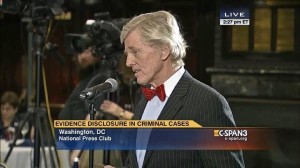Loudoun Circuit Court Judge Thomas D. Horne, as Chair of a “Special Committee on Criminal Discovery Rules,” sought to put a stop to prosecutors ambushing the Accused at trial and, even worse, from withholding evidence of innocence or wrongdoing cabined away by the prosecutor or by his investigators or witnesses; Judge Horne sought to bring “clarity and transparency” to the process.
Anybody who has suffered our criminal justice system knows that you get more information, by law, in a $500 bad debt civil case than if your freedom and reputation are on the line in a criminal case.
Judge Horne’s committee recommended reforms to the “system” to cure these defects. But the Supreme Court of Virginia accepted not one of the long needed reforms.
The best prosecutors in the Commonwealth and across the nation have an open file policy – meaning the Accused gets to see what’s in the prosecutor’s files – because these prosecutors believe their primary directive is to do justice, not to win at all costs.
When I was a federal and a state prosecutor we opened our case file because we knew an adversary for the Accused might see something we overlooked and, even when a witness might be at risk, we’d find a way to make critical information available.
It is an open secret that this nation’s dockets are awash in unjust convictions and too severe sentences because full and fair discovery of what the prosecution knows is withheld on a daily basis.
The most egregious prosecutorial lapses occur with information characterized as Brady, that is, evidence that contradicts the government’s charges, impeaches their witnesses, and mitigates against the more severe punishment the prosecutor is demanding.
US Chief Judge Alex Kozinski, from the Ninth Circuit federal appellate court, wrote in United States v. Olsen, 737 F. 3d 625 (9th Cir. 2013) – “[T] here is an epidemic of Brady violations abroad in the land.”
Judge Kozinski went further and said that there are too many “rogue investigators and forensic experts.” You’ve seen the reports of various federal and state labs impeached by bad practices and outright fraud including how the FBI estimated that over ten thousand cases going back to 1985 involved lab misconduct. Continue reading


